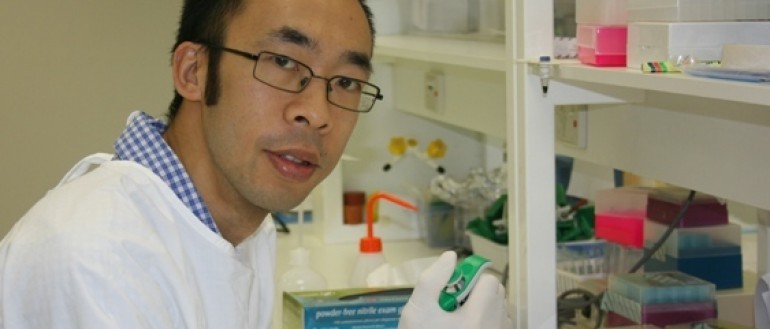Menzies’ Post-doctoral Research Fellow Dr Steve Tong was recently awarded a competitive grant and a fellowship as part of the National Health and Medical Research Council’s yearly multi-million dollar funding round. His fellowship provides support for his salary for the next four years. Steve shared his thoughts on the new funding.
What is the title of your project fellowship?
Clinical and genomic aspects of Staphylococcus aureus and other infectious diseases in Northern Australia.
What major health issue does your research hope to address and how?
The burden of infectious disease is high in Indigenous populations in Northern Australia and patterns of disease differ compared to elsewhere in Australia and the rest of the world.
My research proposes to deepen our understanding of infectious diseases such as that due to Staphylococcus aureus (golden staph), hepatitis B and influenza by applying cutting-edge technologies (e.g., bacterial genomics) to answer clinically relevant questions.
Ultimately I hope to prevent transmission of infections, improve vaccine strategies and find better targets for treatment.
What is the most exciting aspect of your funding win?
This makes it possible for me to continue to uncover fresh facts (such as discovering that Indigenous Australians with Hepatitis B are infected with a novel type of Hepatitis B virus), determine the public health importance of such findings, and then pursue interventions to ultimately improve health outcomes.
I am also excited about the chance to work with research colleagues in both my local context to build research capacity among Indigenous colleagues, and with collaborators in Australia and overseas. The relationships established and maintained through doing research with others is greatly satisfying.
What are the proposed details of your research methodology (sample numbers, sites etc)?
Most of my research is based in the Northern Territory and involves collecting information from patients, together with biological samples (bacterial strains, virus strains, human DNA) and using cutting edge technology (e.g., whole genome sequencing) to understand the interactions between the human host and the pathogens. I will also be conducting randomized controlled trials to find improved treatments for common infections such as golden staph bloodstream infections.
What are the broader health implications of your grant/fellowship?
My aim is to improve prevention (e.g., finding effective influenza and HBV vaccines, reducing S. aureus transmission), diagnosis (e.g., identify targets in S. aureus associated with severe disease) and treatment (e.g., combination therapy for MRSA bacteraemia) in the local setting. Of global significance, my research has identified two novel S. aureus-like taxons and a novel HBV genotype.
For more information on this area of work please click here.

